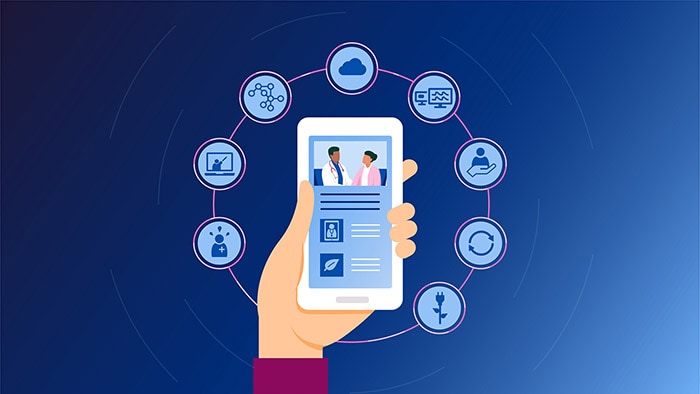Philips convened a multi-stakeholder dialogue in Indonesia, aimed at accelerating Indonesia’s realization of a Healthy Indonesia through health system digital transformation. Mr Setiaji S.T. M.Si., Chief Digital Transformation Officer of Ministry of Health Indonesia opened the dialogue focusing on bridging gaps in healthcare. Together with Mr Roy Jakobs, Chief Executive Officer of Royal Philips and Ms Caroline Riady, Chief Executive Officer of Siloam Hospitals Group, they underscored the need for a cohesive action plan for multi-stakeholders to collaborate and further contribute to Indonesia’s health technology transformation.
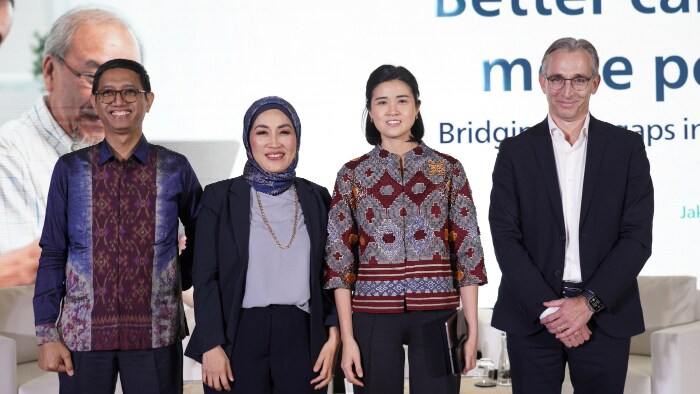
[Left - Right] Setiaji S.T. M.Si., Chief Digital Transformation Officer of the Ministry of Health Indonesia, Astri Ramayanti Dharmawan, President Director of Philips Indonesia, Caroline Riady, Chief Executive Officer of Siloam Hospitals Group, and Roy Jakobs, CEO of Royal Philips, emphasized the necessity of a unified strategy for stakeholders to cooperate and actively participate in advancing healthcare technology transformation in Indonesia during Philips' Media Briefing
The event also marked the launch of the Indonesian results of the Philips Future Health Index (FHI) 2024 report: Better care for more people, which surveyed nearly 3,000 healthcare leaders in 14 countries worldwide. FHI 2024 Indonesia results indicate the health sector’s aspirations for a sustainable and interconnected healthcare ecosystem leveraging artificial intelligence (AI) and data-driven insights. Charting Indonesia’s progress in digital health transformation, the results also show that healthcare leaders are already implementing automation to improve productivity and are seeing the positive impact of virtual care on easing staff shortages.
“Innovation and technology have been a pivotal force in Indonesia’s healthcare transformation. With our digital health transformation strategy working hand in hand with the 'Indonesia Sehat 2025’ vision, we aim to foster a healthy environment for all Indonesians and achieve a Healthy Indonesia,” said Setiaji S.T., M.Si., Chief Digital Transformation Officer, Ministry of Health Indonesia. “Partnerships across the healthcare ecosystem is imperative to unlocking the benefits of data and technology in enhancing care quality and accessibility and improving productivity and efficiencies.”
Partnerships across the healthcare ecosystem is imperative to unlocking the benefits of data and technology in enhancing care quality and accessibility and improving productivity and efficiencies.
Setiaji S.T., M.Si.
Chief Digital Transformation Officer, Ministry of Health Indonesia
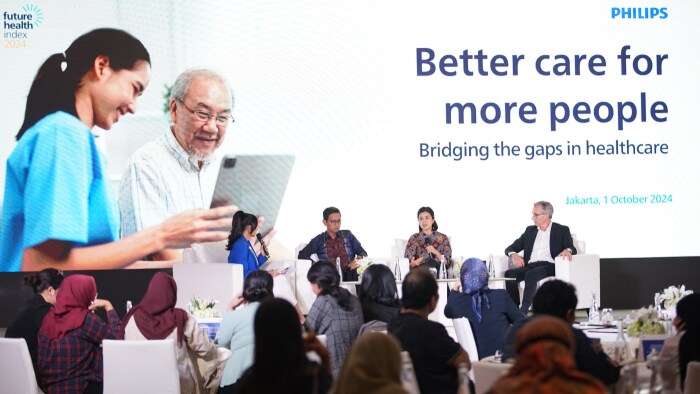
[Left - Right] Setiaji S.T. M.Si., Chief Digital Transformation Officer of the Ministry of Health Indonesia, Caroline Riady, Chief Executive Officer of Siloam Hospitals Group, and Roy Jakobs, CEO of Royal Philips, emphasized the necessity of a unified strategy for stakeholders to cooperate and actively participate in advancing healthcare technology transformation in Indonesia during Philips' Media Briefing
“Healthcare systems are facing immense pressure to deliver high-quality patient care amidst workforce shortages and a growing patient population in many parts of the world,” said Roy Jakobs, CEO of Royal Philips. “At Philips, we are helping to drive systemic change to enhance the capacity across healthcare. Change that looks at technology, clinical practice, financing and regulation as an integrated whole. That’s why collaboration with the care providers, caregivers and the government is so important, because together we can help deliver better care for more people, across care settings,” said Roy Jakobs, CEO of Royal Philips.
At Philips, we are helping to drive systemic change to enhance the capacity across healthcare. Change that looks at technology, clinical practice, financing and regulation as an integrated whole.
Roy Jakobs
CEO, Royal Philips
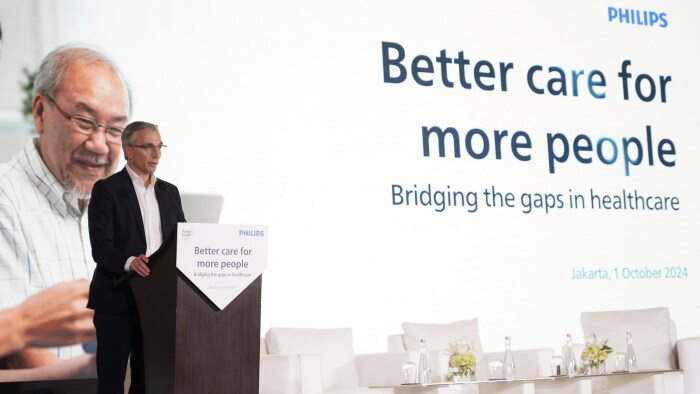
Roy Jakobs, CEO of Royal Philips gave his special address at the Media Briefing: Better care for more people, Bridging the gaps in healthcare
Future Health Index 2024: Bridging gaps in staffing, insights and sustainability In Indonesia, three in four healthcare leaders (76%) surveyed reported that staff shortages resulting in delays in patient care are an issue at their organization. To bridge the gap, healthcare leaders are already implementing automation to reduce the administrative burden on healthcare staff and streamline services for patients. All Indonesian leaders surveyed have also seen positive results from virtual care services, with benefits ranging from increased capacity to serve patients to more flexible work schedules for healthcare professionals. With an understanding of healthcare leaders’ needs, key discussion points from the dialogue highlighted each stakeholders’ impact in contributing to the present and future needs of patients in Indonesia, as well as strategies on how they could partner to drive further progress. Multi stakeholders aligned on the need for a cohesive plan, with the dialogue as a catalyst for actionable steps in digitalization and data integration in Indonesia to improve health performance and resilience as well as enable long-term sustainability and impact. “The healthcare industry in Indonesia is at a pivotal moment. Our hope is that this dialogue will kickstart a cohesive drive towards digitalization to close gaps in staffing, data insights, and sustainability. Our role at Philips is to support with innovations that are sustainable and that directly address the needs of patients and healthcare providers. Working with other stakeholders, we can be confident of creating a healthier future for both the people and the planet,” said Astri R. Dharmawan, President Director of Philips Indonesia.
Moving into the future, healthcare leaders are keen to venture into the next frontiers in AI to unlock new efficiencies and insights. They have implemented or are planning to implement AI for clinical decision support across hospital care including in-hospital patient monitoring, treatment planning, radiology and clinical command center in the next 3 years. 74% are planning to invest in generative AI in the next three years, higher than the global average (56%).
Indonesian healthcare leaders also recognize the transformative potential of data-driven insights, however, almost all leaders (98%) currently face data integration challenges that impact their ability to provide timely, high-quality care. To make the most of the latest innovations including AI, they see the need to improve data security and privacy, provide more transparency around how data will be used and improve accuracy of data.
For healthcare to remain sustainable, almost all healthcare leaders agree that reducing carbon emissions and the environmental impact of healthcare should be a top priority for both healthcare organizations (99% agree) and governments (97% agree). Sustainable procurement (e.g. circular equipment) is a top strategy implemented by healthcare leaders (51%) currently, and 39% plan to implement it within the next three years.
Moving forward with greater collaboration
Our role at Philips is to support with innovations that are sustainable and that directly address the needs of patients and healthcare providers. Working with other stakeholders, we can be confident of creating a healthier future for both the people and the planet.
Astri R. Dharmawan
President Director, Philips Indonesia
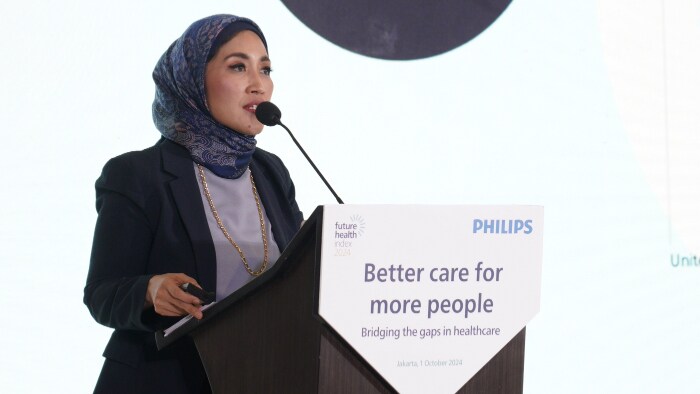
Astri R. Dharmawanti, President Director of Philips Indonesia unveiled the Philips Future Health Index (FHI) 2024 report, which highlights Indonesia's progress and aspirations in adopting digital innovations in the healthcare sector
For further details about the methodology of Future Health Index report and access to the full Future Health Index 2024 report, visit this site. Watch the full multi-stakeholder dialogue and the launch of the Indonesian results of the Philips FHI 2024 report below.
Share on social media
Topics
Contact

Jane Yeo Head of Communications & Brand, APAC
You are about to visit a Philips global content page
Continue











